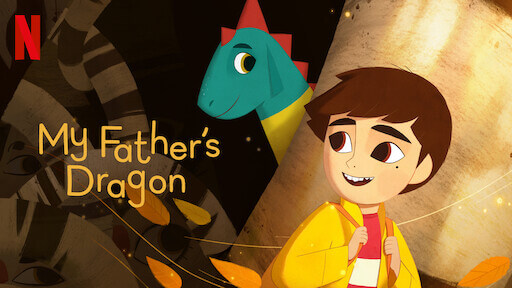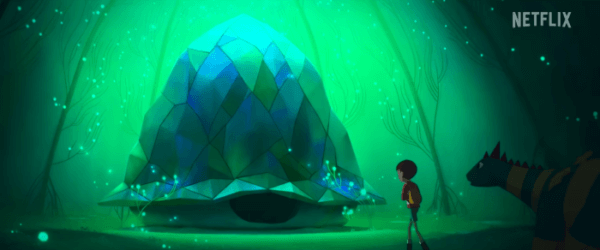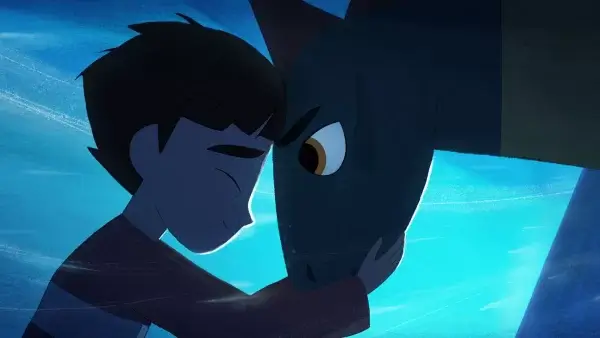My Father’s Dragon: Review of the Latest Cartoon Saloon Feature
Nothing warms the heart like a new Cartoon Saloon movie, especially one directed by Nora Twomey. She, and the studio at large, are endlessly impressive and creative in their ability to make expansive stories that feel like home. The idea of what ‘home’ is becomes a central theme of their latest release, My Father’s Dragon, an adaptation of the beloved children’s book by Ruth Stiles Gannett.
We associate home with comfort and familiarity but My Father’s Dragon is a quest to recognise a completely new and harsh environment as ‘home.’ After leaving their comfortable life in the country, Elmer and his mother Dela move into the big city, aptly named Nevergreen. The dichotomy between their new and previous lives is too big a change for Elmer to process well and he yearns for an emulation of the store his mother used to run. After a talking cat with the voice of Whoopi Goldberg alerts him to the existence of a dragon on a faraway island, Elmer devises a plan to bring it back to Nevergreen, using its magical allure to raise money to open their new store.
The deeply intimate and personal stakes of the movie’s opening make for gentle and warm watching. The relationship between Elmer and Dela cannot be described as anything less than wholesome, the art style is pastel, soft and comforting, and viewing this life-shifting change through a child’s eyes provides a relatability. We see Elmer finally start to view his mother as mortal when financial issues arise. We see the effects of poverty on his innocence as he tries to force himself into a breadwinner position in the household. The magical realism that is still to be introduced leaves the forefront of your mind in this section of the movie. The characters are so well drawn and their relationships and struggles so well defined that you could watch an entire movie of them simply trying to make it through the month.
Once Elmer sets sail away from Nevergreen and towards Wild Island, the supposed resting place of this dragon, some of this intimacy is lost in favour of an epic-feeling story. In some regards, this is disappointing, but it also allows for the film to push itself visually. The design of Wild Island is gorgeous and the supernatural events that take place there are depicted with an incredible balance between subtlety and grandeur. Every landscape shot in this film is worthy of a place in the Louvre and I refuse to stop campaigning for their inclusion.
The expedition away from Nevergreen also represents the movie’s biggest shift in tone and writing style. Introducing characters like Judy Greer’s Soda and the titular Dragon, Boris, sees the writing shift to accommodate their hyperactive and clumsy personalities. Though Soda’s appearance is brief, we spend almost the entirety of the remaining runtime with Boris, a character who seems to be at 100% all the time. This might work for some viewers as Boris provides a levity to what had been a challenging story up to this point, but the relentlessness of Boris’ personality can cause a grating effect when the films looks to achieve emotionally heavy moments. Boris’ entire arc is about emotional metamorphosis as he looks to complete a ritual undertaken by every dragon. The process of becoming an After Dragon is analogous to coming of age, but Boris’ character lacks the weight to make that change feel significant.
Other important players in the story include a gorilla and a macaque named Saiwa and Kwan respectively. These two primates are in charge of Wild Island and are tasked with protecting all life on it. Saiwa had captured Boris in order to use his power of flight to stop the island from sinking, an eternal threat for the beings who live there. As much as Boris displays an unending silliness, Saiwa and Kwan are pictures of seriousness. The gravity of their jobs and situation locks them out of the playful nature which the film maintains from the start. When they share the screen with Elmer and Boris, there is an intangible distance between the stories both parties are playing out. Elmer’s quest to urgently save the island and bring Boris back to Nevergreen sees him caught between the two tones, with the film unable to shift between the two deftly.
A massive success of My Father’s Dragon is how it introduces characters with goals that seem simple on the surface, but the mechanics of how they are achieved makes the whole thing so much more complicated. Elmer just wants to open a store with his mum, Boris wants to become an After Dragon, Saiwa wants to save the island, Dela wants to support herself and her son. Elmer’s innocence and naiveté means his attitude towards the problems of his own and of others is somewhat dismissive. The goals seem simple, just go and do them.
Elmer’s journey is about learning the complexity and grey areas of life, and though the movie does swing in tone, it achieves that primary arc beautifully. The opposing nature of the characters can be jarring but in isolation there are no important players without depth, and everyone has something of value which Elmer learns from. Matched with some of the best visuals of any film in 2022, this makes My Father’s Dragon a heartwarming watch and a worthy addition to the Cartoon Saloon catalogue.





